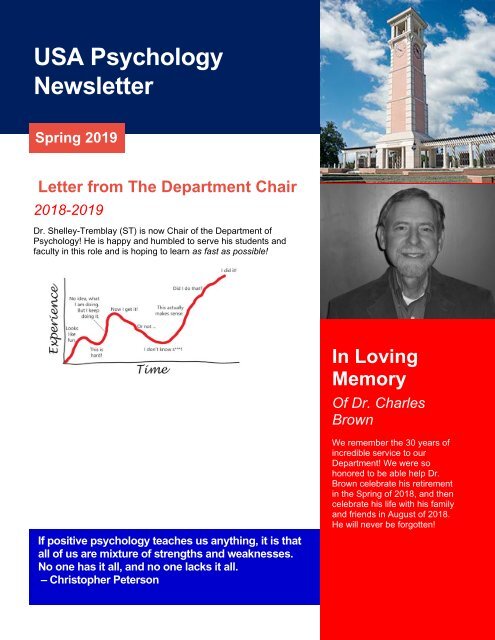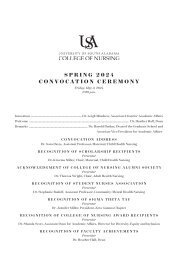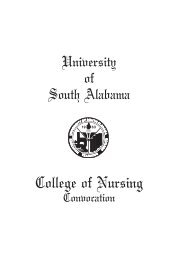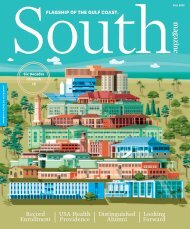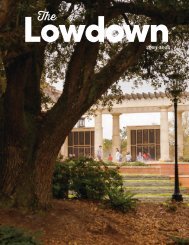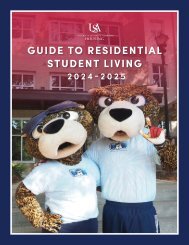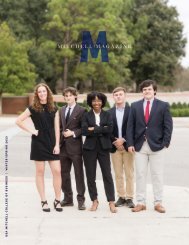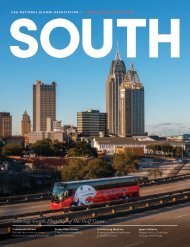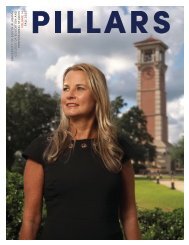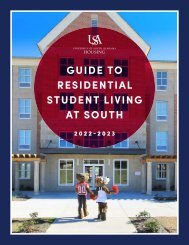USA Psychology Newsletter 2018-2019
USA Psychology Newsletter 2018-2019
USA Psychology Newsletter 2018-2019
You also want an ePaper? Increase the reach of your titles
YUMPU automatically turns print PDFs into web optimized ePapers that Google loves.
<strong>USA</strong> <strong>Psychology</strong><br />
<strong>Newsletter</strong><br />
Spring <strong>2019</strong><br />
Letter from The Department Chair<br />
<strong>2018</strong>-<strong>2019</strong><br />
Dr. Shelley-Tremblay (ST) is now Chair of the Department of<br />
<strong>Psychology</strong>! He is happy and humbled to serve his students and<br />
faculty in this role and is hoping to learn as fast as possible!<br />
In Loving<br />
Memory<br />
Of Dr. Charles<br />
Brown<br />
If positive psychology teaches us anything, it is that<br />
all of us are mixture of strengths and weaknesses.<br />
No one has it all, and no one lacks it all.<br />
– Christopher Peterson<br />
We remember the 30 years of<br />
incredible service to our<br />
Department! We were so<br />
honored to be able help Dr.<br />
Brown celebrate his retirement<br />
in the Spring of <strong>2018</strong>, and then<br />
celebrate his life with his family<br />
and friends in August of <strong>2018</strong>.<br />
He will never be forgotten!
Meet The Faculty<br />
Dr. Joshua Foster<br />
Dr. Foster’s research program continues to focus<br />
primarily on narcissistic personality. With the<br />
election of Donald J. Trump—arguably the world’s<br />
most famous narcissist—as 45th President of the<br />
United States, he believes that his research has<br />
never been more relevant. Dr. Foster’s lab is<br />
currently finishing up a study that is part of a<br />
multisite research collaboration on narcissism and<br />
persuasion. Specifically, they are putting to the<br />
test whether narcissists are as good as they say<br />
they are at persuading others. The results are still<br />
preliminary, but it looks like they are going to be<br />
able to tell a pretty interesting story in the final<br />
paper that emerges from the project.<br />
Personal Life<br />
Dr. Foster’s spouse, Dr. Hope Jackson,<br />
continues to do phenomenal work treating<br />
anxiety, mood, and eating disorders at her new<br />
office location on Spring Hill Avenue<br />
(bayareaclinical.com). They have two boys,<br />
Mathew (10) and Colin (6), who are growing up<br />
quickly and fast becoming incredible Fortnite<br />
players (and dancers). Dr. Foster and family<br />
recently welcomed a new dog to their humble<br />
abode. Her name is Dixie and she is a<br />
Dachsund- Terrier a bunch of other stuff mix, and<br />
a very sweet girl.<br />
In more general research news, Dr. Foster coedited<br />
a new book, The Handbook of Trait<br />
Narcissism (Springer), that was recently<br />
published. It contains 51 chapters written by 89<br />
authors from nine different counties on, you<br />
guessed it, narcissism. His co-editors are Tony<br />
Hermann (Bradley University) and Amy Brunell<br />
(Ohio State). Dr. Foster noted that he is thrilled<br />
with the final product. Furthermore, he is<br />
pleasantly surprised by how well such a large<br />
group of narcissism researchers were able to<br />
work together.
Dr. Benjamin Hill<br />
Dr. Hill and the Neuropsychology Lab are staying<br />
busy the last year. Current doctoral students in<br />
the lab include Jameson Beach, Sarah Taylor,<br />
Murphy Harrell, and Stephen Aita. Sarah won an<br />
award at the recent National Academy of<br />
Neuropsychology meeting for her poster “Base<br />
Rates of Failed Performance Validity Tests in a<br />
Chronic Pain Sample.” This is part of an ongoing<br />
collaboration with Dr. Jake Epker studying chronic<br />
pain patients and ways to improve pre-surgical<br />
evaluations for back pain. Dr. Hill and Stephen<br />
Aita also published a paper on positive effort or<br />
factors that improve test performance such as<br />
personality traits like Need for Cognition and grit.<br />
The lab is doing other studies looking at how<br />
personality factors impact cognitive abilities on<br />
neuropsychological tests. Ben is also continuing<br />
his collaboration with Dr. Diego Alvarez in the<br />
College of Medicine examining cognitive effects of<br />
metabolic inflammation associated with factors<br />
such as obesity, diabetes, and heart disease.<br />
The Neuropsychology Lab is involved providing<br />
clinical services at a number of different sites in<br />
the area. Lab members work with a local<br />
traumatic brain injury support group affiliated with<br />
the Alabama Head Injury Foundation and have<br />
also provided services to Veterans at both the<br />
Pensacola VA and Biloxi VA the past year. Sarah<br />
and Murphy have given talks about dementia to<br />
community groups as part of an educational<br />
outreach and Ben also gave a recent talk about<br />
how to recognize different types of dementia at a<br />
local workshop for Volunteers of America. Lab<br />
members also offer neuropsychological<br />
evaluations at a very reduced rate to the<br />
community through the <strong>USA</strong> Psychological Clinic.<br />
Dr. Hill was recently elected to a 3-year term on<br />
the Board of Directors of the National Academy<br />
of Neuropsychology and is also on boards for<br />
APA Division 40 Society for Clinical<br />
Neuropsychology. These positions provide<br />
exciting opportunities to collaborate with leaders<br />
in the field on issues relevant to clinical<br />
neuropsychology and extend the South Alabama<br />
brand. He was also made a Fellow of the<br />
National Academy of Neuropsychology this year<br />
which is a significant honor. Closer to home, Ben<br />
continues to serve on the Executive Committee<br />
for the Alabama Psychological Association and<br />
has enjoyed getting to know psychologists<br />
around the state in this role.<br />
Overall, the Neuropsychology Lab continues to<br />
roll along and had another excellent year.
Dr. Joshua Isen<br />
Like father, like son?<br />
It is not often that a principal investigator serves as a participant in his own research study. But Dr. Isen<br />
did just that. He submitted his high-school senior yearbook photo as well as that of his father. The goal<br />
of the “Family Yearbook Study” is to examine familial resemblance for facial attractiveness. It seems<br />
almost axiomatic that “beauty” runs in families, but the evidence for this is sparse. A previous study<br />
looked at parent-offspring resemblance by comparing photos of college students to their currently<br />
middle-aged parents. This tremendous age difference likely underestimates the true parent-offspring<br />
correlation in attractiveness. To rectify this methodological problem, all photo materials in the Family<br />
Yearbook Study derive from participants’ senior year in high school.<br />
Dr. Isen was collected 732 yearbook photos from <strong>USA</strong> undergraduates and their family members (in<br />
addition to 3 yearbook pictures from the Isen family). When obtaining data, it was necessary to keep the<br />
motive of the study somewhat vague. Bluntly telling students that their picture will be evaluated for<br />
attractiveness is not the best way to encourage participation. Dr. Isen was helped by his two research<br />
assistants – Meghan Dean, who was bestowed the Outstanding Undergraduate Student award by the<br />
<strong>Psychology</strong> department in <strong>2018</strong> and Kristen Mechanic, who received the top award for a master’s<br />
student in Behavioral & Brain Sciences in <strong>2019</strong>.<br />
The results are largely in and are rather surprising. After procuring evaluations from 200 anonymous<br />
raters, the average attractiveness ratings of parents were only modestly correlated with those of their<br />
offspring. This is perhaps because additive genetic effects have little influence on facial attractiveness.<br />
[Additivity occurs when the alleles inherited from parents have independent effects on a trait and simply<br />
“add up” in a linear fashion.] Rather, Dr. Isen believes that non-additive genetic effects (e.g., dominance,<br />
recessiveness, and epistasis) which, by definition, are unshared between parents and offspring, loom<br />
larger. Additionally, prenatal and other early environmental factors probably influence facial<br />
attractiveness to a significant degree.<br />
To underscore the lack of similarity in facial attractiveness between parents and offspring, take a look at<br />
the two photos below. The first one is of Josh Isen and the second image is of his father. They received<br />
vastly different attractiveness ratings, with the clear edge going to the black-and-white image! (Note: All<br />
other participants’ data have been, and will continue to be, kept confidential)
Dr. Jennifer Langhinrichsen-Rohling (Dr. L-R)<br />
This year, Dr. L-R and her Gulf Coast Behavioral Health and Resiliency Center (GCBHRC) team,<br />
Candice Selwyn, Cory Wornell, John Friend, and Daphnee Cherisol were hard at it! As Executive<br />
Director of the GCBHRC, Dr. L-R and her staff enacted her center’s mission through a variety of service<br />
delivery (> 7,000 patients received care), education (over 30 presentations), and scholarship activities<br />
(15 papers published in <strong>2018</strong> or in press). Numerous <strong>USA</strong> faculty and community professionals were<br />
also involved in center activities including: on-site professional workshops in Vicarious Trauma,<br />
Generational Resiliency, Trauma-Informed School Systems; year-long training in Trauma-Focused<br />
Cognitive Behavioral Therapy for Children; suicide prevention activities and policies; <strong>USA</strong> Disaster and<br />
Trauma Alliance activities; obtaining a Certificate in Trauma Education from the International Society of<br />
Traumatic Stress Studies, and helping form a city-wide safety and wellness initiative called Project<br />
THRIVE. As an acknowledgement of this work, Dr. L-R was honored to receive the College of Arts and<br />
Sciences Outstanding Service Award!<br />
Dr. L-R’s lab team has also been extremely active. In <strong>2018</strong>, Selena Jackson successfully completed her<br />
internship and defended her dissertation. Caitlin Anderson is on internship at her 1st choice APA<br />
accredited internship site. Mallory Schneider won a dissertation funding grant this fall and is studying<br />
pediatric patient’s parent’s preferences for integrated health care screening processes. Emma Lathan<br />
Powell and Jessica Duncan have been immersed in an action research project centered on testing<br />
unsubmitted sexual assault kits located within the Mobile Alabama police department. Jose Gonzalez<br />
has been supported on a grant with Lifelines Family Counseling Center which has led him to educate<br />
community members in suicide prevention programming. This fall, two new graduate students joined the<br />
lab. Quickly getting up to speed, Megan Blanton and Fallon Richie have already joined the push to<br />
disseminate the data we have accumulated across the past few years! Finally, the lab has enjoyed the<br />
contributions of a number of top-notch <strong>USA</strong> undergraduates including, Malaya Richards (honors thesis<br />
completion), Ben McPeak, and Tyler Bell (former student).<br />
Across <strong>2018</strong>-19, GCBHRC’s main accomplishments included:<br />
• Our providers (to include our full-time and student BHPs, MCPSS BHP, Family Medicine BHP, and <strong>USA</strong><br />
Psychiatry Residents) had over 7,000 individual patient encounters this year. Our direct service provision<br />
ends November <strong>2018</strong>; however, our providers have been hired by MCHD, MCPSS, BCE, Biloxi and<br />
Mobile VA, <strong>USA</strong>FM, <strong>USA</strong> Psychiatry, <strong>USA</strong> Counseling Center and others!<br />
• Provided training to over 370 individuals in topics to include:<br />
o Chronic Disease Management, A 3-hour training in Vicarious Trauma, Trauma-Focused CBT, An<br />
online module on Trauma-Informed Primary Care was created to be incorporated in the curriculum<br />
for all incoming Family Medicine Residents at <strong>USA</strong>, Trauma: Beyond the Physical Injuries was<br />
presented to medical students, residents, and attendings at the <strong>USA</strong> Trauma Center.
o Creating a Safe and Trauma-Free Classroom was delivered to Pensacola public school teachers<br />
designated as highly effective, A Primer in Trauma-Informed Care was delivered to the Family<br />
Intervention Team, an initiative of the Mobile Police Department, the Gulf States Health Policy<br />
Center, & at South Alabama Mental Wellness Conference., Mental Health First Aid – Public Safety,<br />
Crisis Intervention Team Training, Mental Health First Aid, 6th Annual Generational Resiliency<br />
Conference, Trauma-Informed Behavior Management was delivered Boys & Girls Club staff<br />
members. The goal of this training was to teach all Boys & Girls Club staff trauma-informed<br />
behavior management strategies for child and adolescent members., “Putting SBIRT into practice”<br />
on the SBIRT model of intervention for substance use in primary care was presented to family<br />
medicine residents.<br />
As an extension of the work being done by the APPLE team, GCBHRC worked with the Mobile<br />
County Public School System to begin implementing a model to promote a Trauma-Sensitive School<br />
System.<br />
<strong>USA</strong>DATA was active this year (working toward faculty/staff obtaining trauma informed certificates<br />
from ISTSS; establishing a Trauma Focused CBT clinic for traumatized children). The mission of the<br />
alliance is to create a community of trauma-informed educators, clinicians, and scientists of various<br />
backgrounds and expertise. Alliance members will be supported to advance their trauma knowledge.<br />
They will be encouraged to take their new training and infuse it into their own teaching, research, or<br />
community action projects.<br />
In partnership with the GCBHRC, a number of trauma informed initiatives are in the works at the<br />
university, hospital, and city levels. Specifically, we are inaugural members of a city-wide initiative -<br />
Project THRIVE and have created a logic model and partner schematic for this group. Project THRIVE<br />
is a multidisciplinary coalition led by the Mobile Police Department Office of Strategic Initiatives to<br />
promote safety and wellness while also addressing the effects of trauma on the citizens of the City of<br />
Mobile. The mission of Project THRIVE is to make Mobile a trauma-informed community – so that<br />
helpers in every agency and every part of our system are cared for and know how to care for others. As<br />
Project THRIVE, we are committed to weaving our community closer together and making strong<br />
community partnerships. We are dedicated to Trauma Healing and Resiliency In the wake of Violent<br />
Events. Our vision is to create an enduring culture of safety, trust, and hope where all individuals and<br />
families in Mobile, Alabama are empowered to achieve optimal health and well-being. This year THRIVE<br />
was formally recognized and supported by a proclamation from the Mayor and the Mobile City Council.<br />
• The contracts for two GRHOP Langhinrichsen-Rohling Health Capacity Scholarships (Graduate<br />
and Undergraduate) were executed this year.<br />
• Over 35 posters/presentations were presented at various conferences and venues this year.<br />
• Over 15 Manuscripts/Book Chapters/Assessment Measures were Published in <strong>2018</strong> or “In Press”.
Dr. Wyndolyn (Wyndi) M. A. Ludwikowski<br />
Dr. Ludwikowski has been serving as a visiting assistant professor in the Department of<br />
<strong>Psychology</strong> for the <strong>2018</strong>-<strong>2019</strong> school year. After graduating with her PhD in counseling<br />
psychology and with a certificate in quantitative psychology from Iowa State University in 2013, she<br />
joined the Department of <strong>Psychology</strong> at Xavier University of Louisiana as a tenure-track professor.<br />
Moving with her family to Mobile, Alabama, in <strong>2018</strong>, she had the opportunity to join the Department<br />
of <strong>Psychology</strong> at <strong>USA</strong>, where she teaches a number of undergraduate courses, including<br />
Introduction to <strong>Psychology</strong>, Research Design and Analysis II, Abnormal <strong>Psychology</strong>, and<br />
<strong>Psychology</strong> of Gender. Dr. Ludwikowski conducts research on explaining career decision-making,<br />
on help-seeking stigma, and on the teaching of psychology. Since starting her appointment at<br />
<strong>USA</strong>, Dr. Ludwikowski has secured two publications, one in the Journal of Career Assessment and<br />
another in The Counseling Psychologist. Since moving to Mobile, Dr. Ludwikowski enjoys<br />
volunteering for the Mardi Gras Eco-Team as well as the <strong>USA</strong> Archeological Museum.<br />
Dr. Lisa A. Turner<br />
This has been an exciting year in the Brain and Behavior Science (BBS) program. The program<br />
welcomed the first Accelerated Bachelor’s to Master’s (ABM) students. These students will<br />
complete their undergraduate and master’s degrees in five years. Dr. Turner, as interim chair of<br />
the <strong>Psychology</strong> Department this past year has been heavily involved in shepherding the program’s<br />
development and integration into the Department.<br />
Dr. Turner’s lab is focusing on the development of emerging adults. Newly added to her lab team<br />
is Katey Hayes, who joined the BBS program from the University of Tennessee – Chattanooga.<br />
They are investigating the relation of Helicopter Parenting to Empathy and Prosocial Behavior.
Dr. Heidi Lyn<br />
This is Dr. Lyn’s first year here at <strong>USA</strong>, accepting the position of Associate Professor and Joan M.<br />
Sinnott Chair of <strong>Psychology</strong> Comparative <strong>Psychology</strong>, Evolutionary <strong>Psychology</strong>. She hasn’t had trouble<br />
keeping busy. In August, Dr. Lyn moved her office from the University of Southern Mississippi’s (USM)<br />
Gulf Coast campus to <strong>USA</strong>. With that move came new challenges, including setting up her new lab,<br />
finding her way around a new campus, and learning the administration and rules for doing research in a<br />
new university. Dr. Lyn continues to work with her 5 graduate students from USM, to complete their<br />
degrees. Helping Dr. Lyn in this difficult task are her research assistants (and <strong>USA</strong> adjunct), Jen<br />
Christopher and student, Tabatha Lewis. They have brought 6 undergraduates into the lab to begin<br />
work on new projects (one that will survey how human interaction affects squirrel food preferences).<br />
Dr. Lyn’s students have been particularly successful this year, with 2 different students winning awards<br />
to present their work at international conferences. Throughout the lab, they have presented 5 different<br />
projects (ranging from dolphin and otter vocalizations to aggressive grooming in bushbabies) at various<br />
conferences, including the OceanNoise conference in Japan, the International Otter Congress in China<br />
(upcoming), and the Acoustical Society of America conference (in Victoria, Canada). The main<br />
conference for members of the lab team is the Comparative Cognition Conference, which each year is in<br />
Florida. This year, Dr. Lyn and students will have 3 talks at the conference with 4 graduate students and<br />
herself attending. They hope to also bring a few undergraduates along, so they can see the breadth of<br />
work that is presented. Also, Dr. Lyn hopes the lab team gets an opportunity to enjoy time with one<br />
another, as the conference takes place on the beach and talks don’t begin until noon.<br />
When it comes to more standard measurements of academic success, Dr. Lyn has team have been<br />
doing well. So far this year, they have had two students complete their master’s theses, with one other<br />
scheduled to defend and 2 doctoral dissertation students ready to defend within the next 6 months. Dr.<br />
Lyn has also had a peer-reviewed paper accepted for publication, as well as a book review, and three<br />
encyclopedia entries published. In addition, she branched out a bit with a chapter that discussed the<br />
literary use and treatment of animals in the podcast “Welcome to NightVale”. Her work was recognized<br />
with a Diverse Intelligences Synthesis Prize, to support her work on a white paper exploring the<br />
expression of positive emotions in nonhuman animals, and with a featured article in Scientific American,<br />
which highlighted three researchers who work on the question of language evolution.<br />
Overall, Dr. Lyn has had a very hectic, but productive, six months, and is looking forward to great things<br />
ahead at <strong>USA</strong>.
Dr. Krista Mehari<br />
Dr. Mehari's lab has a several ongoing projects. This semester, she is piloting a violence prevention<br />
program in the 8th grade at a local school, with collaborators in the College of Education (Dr. Benterah<br />
Morton), Spring Hill College (Dr. Chelsea Greer), and the Mobile Police Department Office of Strategic<br />
Initiatives. They will be testing whether the intervention impacts levels of victimization and aggression,<br />
as well as related social-cognitive factors (e.g., empathy, self-efficacy for nonviolence). Based on results<br />
of the evaluation, they will extend the program to the 9th grade, and the program will be implemented by<br />
Mobile police officers in six 9th grade classrooms.<br />
Her lab is also conducting observational coding of videotaped interactions of parents and at-risk<br />
adolescents discussing what the adolescents should do in response to specific conflict situations. The<br />
content (parental messages) and quality of interactions (e.g., humor, lecturing) will be linked to<br />
longitudinal data to explore whether these parent-child interactions predict beliefs about fighting, selfefficacy<br />
for nonviolence, and actual aggressive behavior and victimization. This research can inform<br />
parent and family components of violence prevention programs.<br />
Dr. Mehari's lab is collaborating with the Mobile County Public School System (MCPSS) to identify<br />
longitudinal predictors of drop-out. MCPSS is sharing 13-year data of a cohort of over 2000 students<br />
beginning in kindergarten. Most research on predictors of school drop-out start with middle school at the<br />
earliest. Along with Dr. Powell and Dr. McDermott, Dr. Mehari will explore whether there are "red flags"<br />
that occur in elementary school, which would allow for earlier, and perhaps more effective, prevention<br />
programming.<br />
Her lab is wrapping up the first wave of data collection for a study exploring the relation between<br />
contextual risk factors (e.g., food insecurity, exposure to community violence) predicts maternal mental<br />
and physical health as well as pregnancy outcomes. Although there is extensive research indicating that<br />
maternal mental health during pregnancy predicts poor fetal health outcomes (e.g., premature delivery),<br />
there is minimal research exploring what predicts poor maternal mental health. So far, they have found<br />
that contextual stressors (e.g., exposure to community violence, intimate partner violence, food<br />
insecurity, & housing instability) predict poor maternal mental health. They will follow up with participants<br />
after the anticipated delivery date. By identifying malleable risk factors for poor mental health during<br />
pregnancy, it will be possible to design intervention programs that provide tangible support to women<br />
experiencing stressors during pregnancy.<br />
Dr. Mehari's lab is collaborating with the Mobile Police Department to conduct a program evaluation of<br />
the SCORE program, a jail diversion program for people who have been arrested for minor drug<br />
offenses. Her student, Kimberly Pusey, will use the data for her thesis.
Dr. Phillip N. Smith<br />
Dr. Smith directs the Suicide Prevention Research (SPR) lab. He is currently mentoring six doctoral students<br />
(Shane Kuhlman and Shannon Boone - 5th years; Laura Marie - 3rd year; Nicholas Fadoir - 2nd year; and Kaitlyn<br />
Schuler and Natasha Basu - 1st years).<br />
Dr. Smith is also the Project Director for the JagConnect Program, <strong>USA</strong>’s campus suicide prevention<br />
program. JagConnect is funded by Garret Lee Smith, a $306,000, three-year grant awarded for the<br />
implementation of campus suicide prevention initiatives and outreach efforts. These efforts have<br />
included the ongoing development and delivery of gatekeeper, risk assessment, and crisis intervention<br />
trainings (including trainings for undergraduates, faculty and staff, Counseling and Testing Services,<br />
<strong>USA</strong> Campus Police and the Mobile and Baldwin County Policy Departments). Efforts have also<br />
included partnership with campus organizations, such as Student Government Association and Active<br />
Minds, to plan and execute campus events related to mental health and suicide prevention; the campuswide<br />
distribution of a poster campaign promoting help-seeking for mental health; the provision of<br />
information and resources through the JagConnect website (www.southalabama.edu/jaconnect); and<br />
development of a crisis policy for responding to suicide attempts on campus. The grant is currently in its<br />
final funding year, and the SPR lab are now working to develop plans for the program’s sustainability and<br />
continued suicide prevention efforts on our campus.<br />
The SPR lab have developed several community partnerships to promote awareness of suicide<br />
prevention and facilitate access to training and services and support for community events in the Mobile<br />
and surrounding areas. Examples include:<br />
● American Foundation for Suicide Prevention: Planning and co-sponsorship of the Annual South Alabama Out of the<br />
Darkness walk in Daphne, AL raising almost $60,000 for research, education, advocacy, and support for suicide prevention!<br />
● Lifelines: Provision of training and supervision of crisis counselors for the National Suicide Prevention Lifeline<br />
● National Alliance for Mental Illness (NAMI): Tabling at the Annual NAMI Walk at Medal of Honor Park in Mobile, AL and cosponsorship<br />
of a screening of Suicide: The Ripple Effect at the Jubilee Square 12 Theatre in Daphne, AL<br />
● Survivors of Mental Illness (SOMI): Provision of training in risk assessment and suicide prevention to staff and service users<br />
Dr. Smith is also working with researchers and community partners from the University of Alabama and<br />
America’s Warrior Partnership on Operation Deep Dive, a community base participatory research project<br />
examining the social and contextual causes of suicide in Veterans. Operation Deep Dive is funded by a<br />
4-year, $2.9 million grant from the Bristol Meyers Squibb Foundation and is being conducted across 14<br />
communities, including Mobile, AL. The SPR has been active in the development and distribution of<br />
training and research. The SPR is currently conducting a randomized controlled trial to evaluate the<br />
Alliance Project Gatekeeper Training, which is designed to teach laypersons how to identify, intervene,<br />
and refer for services individuals who may be in distress or suicidal.<br />
Dr. Smith and his team also developed a learning module on suicide risk assessment and management in military<br />
populations for a Veteran peer-support specialist training manual for Dryhootch, a Veteran support non-profit<br />
organization. Lab members will be presenting original research at the 52nd Annual Conference for the American<br />
Association of Suicidology in Denver, CO in April <strong>2019</strong>. The SPR saw five peer-reviewed articles published in<br />
<strong>2018</strong>. Additionally, Dr. Smith and his graduate students have four papers in-press awaiting publication and a<br />
number of others in development and under review focusing on a variety of suicide related topics, including<br />
masculine gender-norms, firearm ownership and storage practices, the protective function of grit, typologies of<br />
suicide-related distress in cancer patients, suicide communication, and the moderating role of meaning-making.
Dr. Jack Shelley-Tremblay<br />
Dr. Shelley-Tremblay (ST) was recently promoted to Chair of the <strong>Psychology</strong> Department. He is happy and<br />
humbled to serve his students and faculty in this role and is hoping to learn as fast as possible.<br />
Dr. Shelley-Tremblay’s Human Event-Related<br />
Potentials (HERP) Laboratory had a busy year.<br />
We have several exciting projects ongoing and are<br />
thrilled to be collaborating with Dr. Harvey<br />
Joanning, Clinical Psychologist and Licensed<br />
Marriage and Family Therapist on “The Brain in<br />
Love: The Neurological Basis of Intimate<br />
Relationships.” This is an ongoing project using<br />
neuroscience methods to examine how couples<br />
communicate, and the physiological and behavioral<br />
correlates of relationship satisfaction and distress.<br />
Check out Dr. S-T at https://www.southalabama.edu/colleges/artsandsci/psychology/faculty/shelley-tremblay.html.<br />
What’s up with the HERP LAB?<br />
With Dr. Shelley-Tremblay’s help, the <strong>Psychology</strong> Department was proud to be co-hosts the Girls Exploring Math<br />
and Science event at <strong>USA</strong>. GEMS is a fun and exciting way for girls in grades 6-8 to explore careers in science,<br />
technology, engineering, and math (STEM). Students pick their favorite subjects, and then get their hands dirty in<br />
workshops designed to showcase how much fun it is to work in associated fields. Workshops are conducted by<br />
professors and local professionals and include making jewelry with DNA, conducting forensic investigations,<br />
hunting for gems and minerals, designing webpages… and many more. The session was entitled, “Is your friend<br />
telling the truth: The psychophysiology of lie detection.”
Dr. Shelley-Tremblay is proud to be on the steering committee of the Alabama Advanced Imaging<br />
Consortium(https://www.alabamaadvancedimaging.org/) Students interested in cognitive neuroscience are<br />
encouraged to speak with him to learn about training opportunities at <strong>USA</strong> and around the state.<br />
Dr. S-T’s lab had a great trip to Southeastern Psychological Association this March! It was in beautiful<br />
Jacksonville, where we presented 3 posters and a talk!<br />
-Lee Knapp presented: Neurophysiological Effects of<br />
Phonology on ERPs in Visual Word Recognition. Donald<br />
Knapp, Hannah Oswalt, Mark Yates, & John Shelley-Tremblay<br />
-Claire Demming presented: Complex Associations Among<br />
Heart Rate Variability, Anxiety, and Cognitive IntraIndividual<br />
Variability. Claire Demming, Melissa Myers, Benjamin Hill, &<br />
John Shelley-Tremblay<br />
-Reagan Thomas presented: The Brain in Love: Differentiation<br />
in Association with Relationship Satisfaction.<br />
Reagan Thomas, John Shelley-Tremblay, & Harvey Joanning.<br />
-Lindsey Clark presented: Numerical Reasoning in Preschool<br />
Aged Children. Lindsey Clark, John Shelley-Tremblay,<br />
University of South Alabama, & Julie Cwikla, University of<br />
Southern Mississippi
Dr. Mark Yates<br />
Dr. Yates is broadly interested in language processing. For most of his career, he has studied how we<br />
read and recognize words. More recently, he has become interested in how individual differences in<br />
skilled readers influence their word recognition and reading. Much of this research has been done in<br />
collaboration with Tim Slattery, who is at Bournemouth University. Their most recent research has shown<br />
that spelling ability influences how we use sound-based information (phonology) when recognizing words.<br />
Most surprisingly, the influence spelling ability has on word recognition depends on how you measure<br />
spelling ability. There are opposite effects for spelling production (e.g., having participants spell words like<br />
conciliatory) versus gauging whether participants can recognize if a particular word is spelled correctly.<br />
They have also shown that individual differences in spelling and reading ability influence eye movement<br />
during reading. The results of this research have been presented at the conferences for the Psychonomic<br />
Society and the Association for Psychological Science. Research from this project has been published in<br />
the Quarterly Journal of Experimental <strong>Psychology</strong> and is currently in press in Cognition.<br />
When not teaching or doing research, Dr. Yates enjoys spending time with his wife Wendy, an<br />
occupational therapist, and his two children Chloë and Quinn. He enjoys reading just about any type of<br />
fiction, listening to music, and watching baseball. If he is not in the office, classroom, or lab you will likely<br />
find him on a ballfield somewhere where his kids play softball and baseball.<br />
Dr. Kimberly Zlomke<br />
Healthy Youth & Families Lab<br />
Dr. Zlomke’s lab focuses on family interactions and improving child and family functioning of children with<br />
developmental disabilities and chronic illnesses. Over the past year, we have had many accomplishments<br />
and lots of community impact. Dr. Zlomke has provided multiple presentations to the <strong>USA</strong> Community,<br />
including Autism Grand Rounds and Pediatric Resident Conferences through the College of Medicine. Dr.<br />
Zlomke was also accepted to the Health Disparities Research Training Program through the University of<br />
Alabama-Birmingham and will spend the next year collaborating with other scholars in the area and<br />
advancing her knowledge in health disparities, epidemiology, and bioethics. Along with students, the HYF<br />
Lab has presented to a number of community organizations including the Mobile County Public School<br />
System, United Cerebral Palsy, and Goodwill/EasterSeals. Jessica VanOrmer, a 4th year graduate<br />
student, recently completed the Research Scholars Program through the Society for Developmental and<br />
Behavioral Pediatrics and also successfully proposed her dissertation. Her work will focus on family<br />
resilience and activities of family connection within families of a child with autism spectrum disorder. The<br />
team is looking forward to where she matches for her clinical internship this spring. Jessica has also been<br />
involved in providing consultation to multiple pediatric specialty clinics through <strong>USA</strong> Women’s and<br />
Children’s Hospital.
Dawn Greathouse, current 3rd year graduate student, has probably had a busy past year. Dawn<br />
welcomed her baby boy Gavin on May 11th. The lab is excited to have a little one hanging around. Dawn<br />
is currently working at The Little Tree Preschool providing ABA services to young children and<br />
accumulating hours for her certification as a Behavior Analyst. Dawn is also developing her dissertation,<br />
which will focus on the effectiveness of Parent-Child Interaction Therapy for children with autism spectrum<br />
disorder.<br />
Kristina Rossetti, current 2nd year graduate student, has served as the coordinator for the Parent-Child<br />
Interaction Therapy study and will be proposing her master’s thesis project in the fall. Kristina is<br />
interested in the role of resourcefulness in buffering stress and promoting health in parents of children with<br />
autism spectrum disorder. Kristina was recently awarded the Graduate Research Enhancement Award<br />
from the Graduate School to support her access of the Interactive Autism Network participant recruitment<br />
service.<br />
Angelia Davis joined the lab in the fall of <strong>2018</strong> from Vanderbilt University. Her work will focus on<br />
predictors and outcomes of pediatric obesity. She has a specific interest in the relationship between<br />
childhood obesity, caregiver stress, lifestyle factors, and exposure to traumatic stress. Angelia is part of<br />
an interdisciplinary research group (psychology, nursing, computing) working on a project aimed to<br />
develop and test a mobile health technology app to prevent obesity in pre-school children.<br />
Members of the lab have had presentations at many national/international conferences over the past year,<br />
including Society for Pediatric <strong>Psychology</strong>, Society for Developmental and Behavioral Pediatrics, and the<br />
Association for Behavioral and Cognitive Therapies. They have multiple manuscripts under review for<br />
publication, and the following are already in print.<br />
1. Jarasvaraparn, C., Zlomke, K. R., Vann, N., Wang, B., Crissinger, K. D., & Gremse, D. A. (in press). The relationship<br />
between sleep disturbance, quality of life, and psychosocial functioning in pediatric patients with inflammatory bowel disease.<br />
Annals of Gastroenterology & Digestive Disorders.<br />
2. Zlomke, K. R., Bauman, S., & Edwards, G. E. (<strong>2019</strong>). Parent-child interactions in children with autism spectrum disorder:<br />
Utility of the Dyadic Parent-Child Interaction Coding System. Journal of Developmental and Physical Disabilities.<br />
3. Jarasvaraparn, C., Zlomke, K. R., Vann, N., Wang, B., Crissinger, K. D., & Gremse, D. A. (<strong>2019</strong>). The Relationship between<br />
sleep disturbance and disease activity in pediatric patients with inflammatory bowel disease. Journal of Pediatric<br />
Gastroenterology & Nutrition, 68(2), 237-243.<br />
4. Graves, R. J., Minchew, L. A., Smith, S., Zlomke, K. R., Caffey, K., Owens, B., Thies, A., Gibert, M., & Fruh, S. (in press).<br />
Breaking the cycle: Changing sleep habits to decrease obesity. International Public Health Journal.<br />
5. VanOrmer, J. L., Edwards, G. E., Zlomke, K. R., Proctor, K. B., & Brestan-Knight, E. (<strong>2018</strong>). Examination of parental<br />
tolerance among parents of young children with and without autism spectrum disorder. Advances in Neurodevelopmental<br />
Disorders, 2, 169-178.<br />
6. Proctor, K. B., Brestan-Knight, E., Fan, J., & Zlomke, K. R. (<strong>2018</strong>). Assessing parental readiness to change: A psychometric<br />
evaluation of the READI-SF in a community sample. Journal of Child and Family Studies, 27, 1054-1064.<br />
7. Beverly, B., & Zlomke, K. R. (in press). PCIT and Language Facilitation for Children with Autism Spectrum Disorder. In C. B.<br />
McNeil, L. B. Quesch, and C. M. Anderson (Eds.), Handbook of Parent Child Interaction Therapy for Children on the Autism<br />
Spectrum. New York, NY: Springer.
Meet The <strong>2018</strong> Graduates<br />
Tyler Overstreet, M.S.<br />
Tyler completed his thesis, entitled, “Experimental Investigation of Hemisphere<br />
Asymmetry Within Romantic Relationships During a Communication Task”. Tyler is a<br />
native of Baldwin county, and has been in the lab for over 4 years. Tyler has been<br />
instrumental in the success of the Girls Exploring Math and Science event at <strong>USA</strong>,<br />
allowing dozens of girls each year to receive training in psychophysiology methods.<br />
Tyler is currently interviewing for Doctoral Programs in Experimental <strong>Psychology</strong>.<br />
Melissa Myers, M.S. (Not Pictured)<br />
Melissa completed her thesis, entitled, “An investigation into the relationship between<br />
measures of physiological and cognitive intra-individual variability and the influence<br />
of anxiety.”<br />
Meet The <strong>2019</strong> Graduates<br />
Reagan Thomas<br />
Reagan is working on her thesis, entitled, “The role of differentiation in couple<br />
satisfaction,” as part of the Brain in Love Project. Reagan plans to continue her<br />
studies in applied psychology in a doctoral program.<br />
Jan-Louw Kotze<br />
Jan-Louw is working on his thesis about bystander intervention in regards to sexual<br />
assault. Jan-Louw plans to continue his studies in a doctoral program at the University<br />
of Minnesota.<br />
Kristen Mechanic<br />
Kristen has successfully defended her thesis looking at trait narcissism. Upon<br />
graduating she is moving to Oklahoma.
Meet The Current BBS Students<br />
Donald Lee Knapp<br />
Lee is in his first year in the BBS Program and will be applying to Cognitive<br />
Neuroscience Programs next year. Lee is collaborating with Dr. Yates on his thesis,<br />
“Effects of Phonological Neighborhood Density on the N400 Event-related Potential.”<br />
Tabatha Lewis<br />
Tabatha is in her first year of the BBS program. Tabatha came to us from the University<br />
of Southern Mississippi. Her research interests are comparative psychology and<br />
primate research.<br />
Claire Demming<br />
Claire is in her first year of the program. She is studying the relationships between<br />
heart rate variability, stress, and cognitive functioning in normal and disordered<br />
populations. Claire came to us from the University of Florida with many great research<br />
experiences under her belt.<br />
Katey Hayes<br />
Katey is in her first year of the program and she is studying the effects of helicopter<br />
parenting on children. Katey came to us from The University of Tennessee at<br />
Chattanooga. She will be applying to doctoral programs next year.<br />
Rachel Andrews<br />
Rachel is in her first year of the program and she is studying contextual risk factors for<br />
perceived stress and depressive symptoms in pregnant women. Rachel Completed her<br />
undergraduate studies here at the University of South Alabama. She plans on applying<br />
to doctoral programs next year.<br />
Lindsey Clarke<br />
Lindsey is The newest masters student and first undergraduate to complete the<br />
accelerated bachelors to masters program. She is studying fine motor movement in<br />
preschoolers in relation to mathematical capabilities. She plans on applying to doctoral<br />
programs next year.


